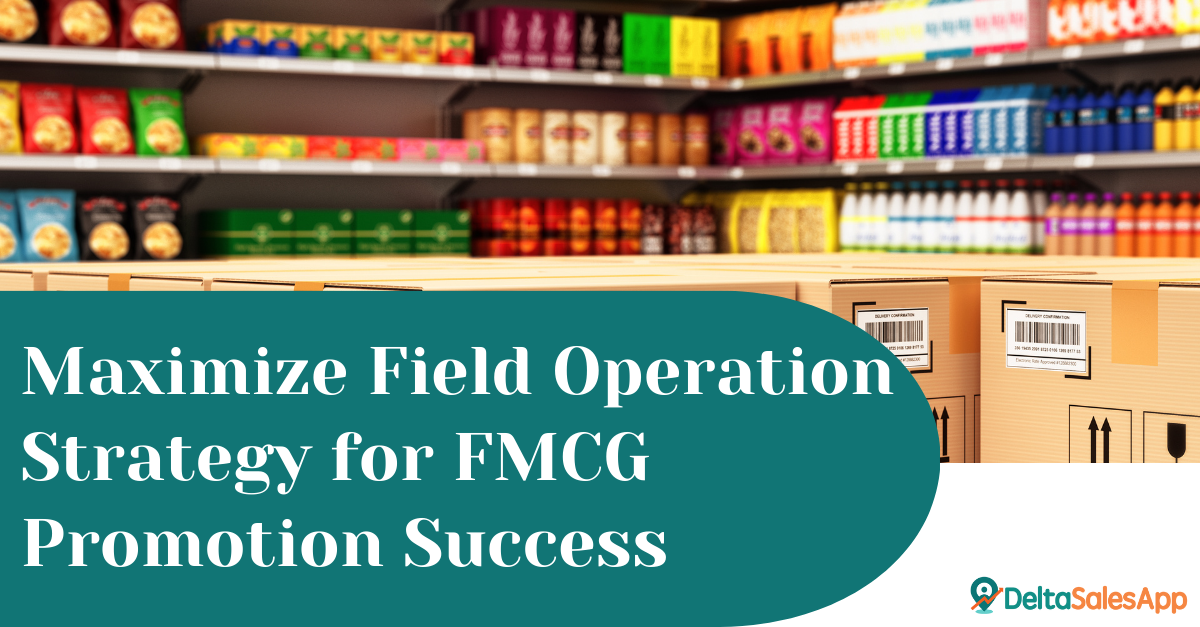Maximize Field Operation Strategy For FMCG Promotion Success

The summer season often brings a surge in consumer foot traffic, presenting a golden opportunity for FMCG brands to strengthen their market presence. But with high stakes comes high pressure—especially when it comes to field execution. To stay ahead, businesses need to optimize their field operation strategy using real-time data, smarter KPIs, and streamlined tools that drive accountability and performance.
Strategic management plays a crucial role in aligning field operations with broader business goals. To better understand let's explore how forward-thinking FMCG companies are preparing for seasonal success through well-planned field operations, retail execution best practices, and smarter use of sales data.
Set Smarter KPIs to Drive Field Team Performance
For high-performing FMCG sales teams, yearly growth isn't just a goal—it's the baseline. The best brands understand that continuous improvement in field operations is driven by KPIs that evolve with business maturity.
Instead of simply measuring store visit counts or display presence, many field teams now focus on display size and visual impact. By increasing goals from 10 cases to 25, 50, and even 100-case displays, field teams remain challenged and motivated. These measurable goals push teams to do more at the store level while helping managers track performance more effectively.
Clear KPIs also promote healthy competition between sales teams across regions, encouraging collaboration and efficiency.
Improve Retail Execution with Better Data Visibility
To execute at a high level, field teams need instant access to relevant sales and performance data—especially during key seasonal campaigns. When data is fragmented or delayed, teams can't pivot in real-time or meet weekly and monthly goals.
With the right tools, managers can track campaign performance store by store, monitor goal progress, and enable reps to access visual dashboards while on-site. This allows sales conversations with retail managers to be more data-driven and results-focused.
Sales teams are naturally competitive. Providing visibility into their progress—as well as how they rank among peers—can ignite a culture of continuous improvement across regions.
Prioritize Field Operation Plans at the Account Level.
Retail execution isn't one-size-fits-all. As campaigns launch, top brands prioritize accounts based on opportunity, past performance, and business alignment. Starting at the account level, successful field managers roll out detailed calendars, ensuring every rep understands which accounts matter most and when to activate promotions.
Field operations should be structured around these priorities—placing high-value locations at the forefront while still maintaining consistency across the territory. Having a structured plan also allows teams to allocate time and resources more effectively, ultimately boosting their execution precision.
Adapt Quickly to Real-Time Data in the Field
Agility in the field is critical during summer promotions. External variables—such as unexpected product demand, stockouts, or merchandising issues—can arise quickly. Leading FMCG brands rely on real-time feedback loops to adapt on the fly, ensuring promotions stay on track even when conditions shift. To learn more about optimizing processes in FMCG, check out our detailed breakdown of essential processes for FMCG companies.
Digital tools for field operations empower reps to share updates instantly, adjust display strategies, and align with headquarters in real-time. This type of flexibility ensures that campaign goals are met and that customer experience at the shelf remains consistent.

Tackle Emerging Retail Challenges Proactively
While summer brings opportunities, it also brings challenges—especially in FMCG. Top-performing brands address these early by incorporating flexibility into their field strategy. A few common challenges include:
-
Supply Chain Shortages: Product availability can fluctuate due to climate impact or supply constraints. A data-powered field operation system helps teams adjust promotional focus to available SKUs.
-
Labor Management: With labor costs rising, efficient territory planning and task automation can help reps accomplish more in less time.
-
Sustainability: Packaging and environmental impact continue to shape consumer preference. Brands investing in eco-conscious packaging can use it as a unique selling point during store visits.
When these challenges are factored into execution plans early, teams can pivot without disrupting momentum.
Conclusion: Field Operation Is the Cornerstone of FMCG Success
For FMCG brands looking to dominate the summer sales season, strong field operations are non-negotiable. With the right KPIs, real-time insights, and a prioritization framework, sales teams can turn seasonal traffic into long-term customer wins.
By focusing on optimization and agility in every campaign, businesses not only meet their promotional targets but also build scalable strategies that grow stronger each year. Now is the time to strengthen your field operation and turn summer into your most profitable season yet.
FAQ:
Q1: Why is it important to set smarter KPIs for FMCG sales teams?
Smarter KPIs drive continuous improvement by pushing sales teams to go beyond basic metrics like store visit counts. Goals based on display size and visual impact motivate teams to achieve more while giving managers clearer insights into performance. This approach also fosters healthy competition and teamwork.
Q2: How can real-time data improve field execution?
Real-time data enables field teams to track campaign performance instantly, make on-the-spot adjustments, and have more data-driven conversations with retail managers. This leads to better decision-making, timely adjustments to displays, and more effective sales strategies.
Q3: What is the best way to prioritize accounts during seasonal campaigns?
FMCG brands should prioritize accounts based on opportunity, past performance, and alignment with business goals. Creating a detailed account-level plan ensures high-value locations are targeted first, allowing reps to focus on the accounts with the most potential.
Q4: How can FMCG brands adapt quickly during unexpected challenges?
Agility is key in field operations. By using digital tools that provide real-time updates and feedback, teams can quickly adjust to external challenges like stockouts or changes in consumer demand. These tools allow field reps to stay in sync with headquarters, ensuring a coordinated response to issues as they arise.
Q5: What challenges do FMCG brands face during the summer, and how can they prepare?
Common challenges include supply chain shortages, rising labor costs, and sustainability concerns. Brands can prepare by using data-powered systems for inventory management, task automation to reduce labor costs, and incorporating sustainability into their marketing to appeal to eco-conscious consumers.
Q6: What tools can FMCG brands use to improve field operations?
FMCG brands can benefit from tools like field sales automation software, real-time analytics dashboards, and inventory management systems. These tools help teams track progress, make data-driven decisions, and adjust strategies in real-time, leading to more efficient field operations and improved sales performance.









